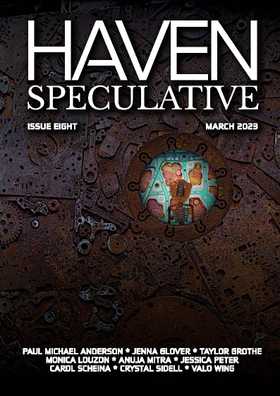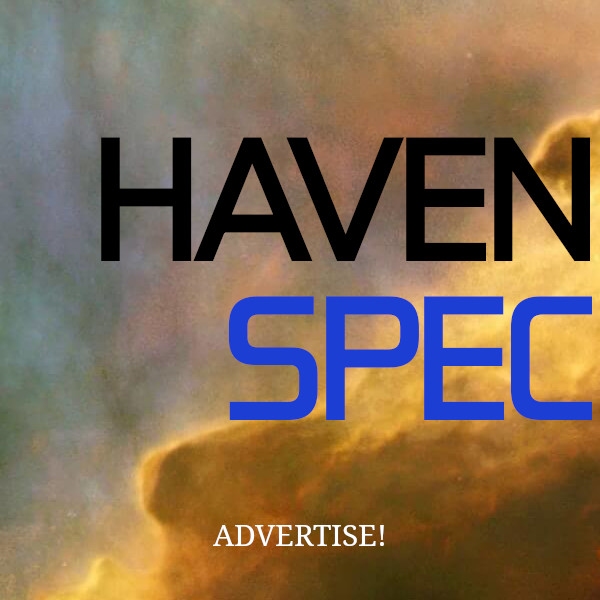FICTION
Guiding My Sister's Shaking Hand
by Paul Michael Anderson in Issue Eight, March 2023
I'm putting this note among Christine's artwork. When everyone finally gives up trying to find her, they'll take apart her studio, parse out the beautiful, shallow things she made, and, somewhere among the shelves, they'll find this little book.
I could never talk about this before, but being on the sidelines means you get an unobstructed view, even of yourself. Because I'm the one who led her to where she is today. Indirectly or directly, every step of the way. I think about those steps when I can't sleep at night.
Is this a confession? What am I confessing to? Being the ignored sister to a troubled genius? Christine was the one with the power. I was just the first one to notice it. Maybe that's it. Everyone, including our parents, seems to have forgotten about me, but Christine was my sister before she was your discussion piece in your gallery. She was my sister before she was your cash cow. Maybe this is why I'm talking about it now. To remind you she was human, and she was my sister.
Everyone knew Christine was talented, even when she was little and doodling on her little drawing pads. This is the "everyone knew" hagiographic portion of the story, but only I knew she was special. Don't let our parents or Christine's agent tell you otherwise. They were all johnny-come-latelys in that regard.
Because she had two drawing pads. Mom had gotten us both one, but I'd never shown any interest in art, so I gave Christine mine and went outside to my rocks. Rocks are solid. Rocks don't require anything of the world. They just are.
The stuff Christine showed her teachers and her friends and our parents—that was rock stuff. Solid. See the dog. Here's our street. Here's the city skyline Christine sketched in the time it took to ride the Incline up Mount Washington. The rock stuff was in the first pad, and it showed she was talented.
But her second drawing pad, the one she showed only me—that showed she was special. It was waterfalls flowing upward and lagoons the color of sunfire and creatures that defied imagination but you somehow knew were herbivores and wouldn't be munching the nymphs that zipped around their massive noodly heads.
I once asked her to draw in front of me. For the next two hours, she lay on my bedroom carpet and drew a vast grassy plain and mountain range of dark, shiny volcanic rock like black glass, all under a sky made almost-white by the twin suns that burned in the far corners. I've kept that picture with me for fifteen years, and I'm sliding it into the back of this notebook. Check that artist signature. It's the boxy one all her "early-period" work has. Take in that impossibility. Take in that realism, like a snapshot from a professional's camera. Even watching her, I couldn't understand how her Prismatic color pencils could translate the image from her head. But that was Chrissy.
And I was the one, when she was entering eighth grade, who said she should show off the second pad stuff. She'd called me into her room to show off her latest thing (a zebra-looking creature with a wooly coat, but seal flippers instead of legs).
“No,” she said, and her voice almost cracked as it somehow extended a one-syllable word into two. She hugged the second pad like I might snatch it away.
"But it's good," I replied. "It shows imagination. Everyone loves that."
She peeped at her sketch. "They wouldn't love this."
"Oh for god's sake, Chrissy, why not? Have you seen some of the crazy stuff that gets made into shows and movies? What's hanging in the museums?"
She flinched at the word crazy; I was losing her. "Your work is ten times better than that." I stood and tapped the top wire spiral of the pad. "This stuff makes you happy. And the minute an artist stops liking the art they make is the minute they need to change direction."
This is typically where all the fluff pieces and biographies come in. She painted a ghoul planet for the Halloween dance poster contest and blew all the other competition out of the water, scoring the twenty-five buck prize and a piece in the local paper. From there, she became The Artist. She painted or drew all the school promo material, even designing logos for the graduating classes up to and including her own, all her stuff dancing on the line between first pad and second pad. It was like she would stick her toe in the water of that kind of creativity, but no one was going to see her swim in it.
That was until she discovered the loom, however.
Her art teachers said in interviews she took to the loom like a fish to water. Compared to her sketchpads and canvases, it was like a kid who's played only with Hot Wheels suddenly being given a Formula One racer.
I only saw it once, when our parents made me go pick her up after school. I found my sister hunched over the monstrous wooden thing like an arts-and-craft version of The Phantom of the Opera’s organ. The studio was vast, littered with art junk that all seemed to be a shade of brown, the loom at the far end of the room. The shhh-clack, shhh-clack of a machine I couldn't begin to decipher the mechanics of echoed off the high ceiling.
"Are you moving in?" I called.
Her head snapped up, startled. She was sweaty and, yes, the room was stuffy, but not hot. Her hair hung in her face in strings. Her skin was pale. Dark circles under eyes that reminded me of Gomez from the Addams Family. I couldn't see what she was making, not from that angle.
She blinked, grinned. "Hey!" Then a frown. "What's the matter?"
"It's six o'clock," I said, crossing the room. "Dinner's cooling as we speak."
She kind of laughed, this manic bark that sound like crumpling tinfoil in my ears, and she kept looking at whatever she was making.
"Yeah, sorry," she said, still glancing, glancing, glancing. "You know how I get."
I studied her. "Whatcha working on?"
She opened her mouth but didn't say anything. A tableau the size of a large screen television stretched across the surface of the loom, and it wasn't rock stuff, nor that weird middle ground stuff she'd gotten school-famous for. It was second pad stuff, the stuff she'd really only ever shown me.
As perfect as her work with paints or pencils could be, it seemed like she'd created a window with that loom. It was stunning—a night time scene of a stream feeding into a green pond, a pebbled cliff face to the side, lush pink forest on the other, three moons in various phases at the top, near where she'd left off. In the center of the pond basked a silhouette of what could've only been a mermaid. In the foreground, she'd been busy articulating the shapes of the nighttime animals, watching the mermaid.
If you're reading this, you know the piece I'm talking about. It was her first big work, but only because her art teacher snapped a pic and posted it online, where it went viral. It hangs in the entryway of our alma mater and everyone comments, even now, ten years later, on how real it looks. Except for that errant orange string, low in the corner.
It's important to note that I saw it before the orange string.
"Jesus, Chrissy," I breathed, looking from it to her.
She was like a little kid again, showing off her second pad. The slight turned down face, but grinning. Uncomfortable with the attention but liking it. She didn't look like that when she was being The Artist, designing posters and programs and logos.
The HVAC kicked on overhead and the water in the tapestry seemed to ripple, the leaves of the darkening forest rustling.
"How?" I managed. These weren't little designs you find in knitting or crocheting or whatever the hell it is. It was like a window that someone had pulled the blinds up to reveal the view. If I squinted, I could just maybe see the patchwork of threads, but it made my eyes ache.
"Pretty simple, actually," she said, but she said it with sweaty, pale skin and sick eyes. "Just a matter of the right threads."
"Seriously, though," I said. I was reaching my hand towards the tapestry and, out of the corner of my eye, I swear I saw Chrissy jerk, like she knew what was going to happen, but I touched the fabric and my fingers sank in.
I yanked them back with a yipe, and they were wet and cold, like I'd just dunked my hand in a bucket full of cold water. Or a pond in the moonlight.
I staggered away, looking at my hand. There were droplets of green water on my black nail polish.
"Patty—" Chrissy started.
"What—"
She was off the loom bench and holding my arms as if to keep me in place. I expected some kind of an explanation—of context, of framing, of something that would make this make sense—but she said, "That wasn't intentional, but this is so different than paints and color pencils."
I found my mouth, the ability to breathe and articulate sounds. "How?"
"I don't know. It just...is."
I wiped my hands on my pantleg. "Is this the first time?"
"No, but it's still new to me." She went back to her bench and pulled up a hank of the orange thread. "This will make it so it's just a picture, though." She looked back at the tapestry. "I'll have to do it first thing from now on."
I nodded dumbly. I could feel the wet spot on the leg of my jeans.
Chrissy got back to work, and I watched her finish—working the pedals with her feet, passing this weird wooden boat thing between the threads. The tapestry moved and shook with life in a way that you expected the water to move or the leaves to rustle in a breeze. I didn't wonder if she was creating a window to the world we saw or if she was creating the world itself. That came later.
"Done,” she said, standing.
"Done?"
She put her hand on the tapestry. Solid as shale. Eye-achingly beautiful to look at, but still just a tapestry. I could see the threading now without getting a headache.
"Can you, like, leave it?” I asked, backing towards the door almost unconsciously. My hands and leg were still somehow cold, but I didn't know if that was real or my mind scrambling to grasp the situation. “It's Friday, and we're now both late. I'll drive you back here on Monday. Swear."
She nodded, and her shoulders were so rounded, her posture so slumped, that her whole body swayed. "Sure," she said, grabbing her shoulder bag and struggling to catch up as I speed-walked out of the studio.
The art teacher came the next morning, took a photo of the tapestry with her iPhone, and my sister's short, blazing career began. If I had not stopped her from taking it off the loom, would things have been different? I wonder that a lot.
What little I know of the modern art world is that it is incredibly capricious and hard to personally sustain—either you get huge and then suddenly disappear, or you just kind of mosey along, never making waves.
But Chrissy, like everything else about her, was different. How many modern artists stay relevant in the public consciousness through sheer talent and force of the work? It seems like when an artist makes the news, it's either for a crime or publicity stunt. Chrissy—I'm sorry, Christine—stayed in the public eye through just her work. She did full-on second pad stuff, and someone else had seen it and loved it. They wanted more, and Chrissy, for the first time, seemed willing to give it to them.
But I worried as I watched the hurricane forming around her. She didn't do a lot of tapestries, but she did some—always with that orange thread that became as much her signature as her actual one.
That surreal evening in the Henry Hudson High art studio was one of the last times I was alone with Chrissy. When she was Chrissy, my sister, and not Christine, The Artist. I left for college when she began her senior year, and we drifted far, far apart, each drilling down into our own lives. I only ever saw her from the safety of my screen or a magazine page. I never went to her art shows because she never invited me.
Sometimes she'd send me work—small, colorful sketches she knew I'd appreciate and not try to sell. It reminded me of when she'd come to my room to show off her second pad, though now it arrived First Class from Milan or Tokyo or Argentina via a pseudonym she used. I'd thank her through text and we'd talk—there's a clip on YouTube of Chrissy on her phone and grinning while waiting to meet the President and, given the timestamp, I can tell you that we were texting—but it wasn't like I was talking to her in our house or the art studio. The screen got in the way. Our very, very different lives got in the way.
I tried not to worry, but it was hard because of the distance. I spent those six years watching my sister, consumed with a kind of unfocused anxiety. I didn't know if the people surrounding her understood what she could do, or what it did to her, or even if they cared. Her agent Tabitha reminded me of a lizard sunning itself on rocks—and my sister was the sun. I didn't know how to cross that bridge and get to Chrissy. Not Christine, The Artist, but my little sister.
I didn't worry too much about the paintings. I worried about the tapestries. When they would show up—and they'd of course go viral—I would text Chrissy, reach out and make sure she was all right without coming right out and saying it. And there was no way of knowing if her agent was telling her to back off, to eat something. Not that Tabitha would know exactly what was happening, but she'd see her skin, wouldn't she? Chrissy's Addams Family eyes?
When I finally got a chance to really see her, over a year ago, it was on her turf, in her studio, and all my unfocused anxiety focused into a laser-like burning. We no longer knew how to talk to each other, and her entourage of art-world hangers-on kept invading any space that she occupied, pulling her away from quiet moments because there was a show she had to see, a meeting to attend, an interview to give, and blocking me from seeing my goddamned sister, of actually seeing Chrissy and not Christine. It caused a kind of mental claustrophobia that was suffocating for me, and I was only a spectator. Christ knows how Chrissy handled it.
Everyone knows her studio from that lavish spread in Vanity Fair two years ago—busy and colorful and overflowing with works in-progress, filled with light from all the windows and skylights. A few hours before I headed back upstate, I found her there, painting a medium-sized canvas, her arms stained halfway to her elbow.
"You almost ready to head out?" she asked, not looking up. Her thin, dark hair framed her gaunt face.
“Yeah,” I said, and crossed my arms over my chest to keep myself still. I stood in her doorway, and I couldn't cross, the space between us a metaphor for the gulf of years. I wanted to rush in, grab her, shake her, as much as I wanted to rush back upstate and away from the hurricane, but I couldn't do anything but shiver with unspent energy. I wasn't speaking to Chrissy. Christine, The Artist, spoke to me, and with Christine, the distance was a wall.
"It's a shame you have to go," she said. I couldn't see what she was painting, but her brush kept making these short, fussy little brush strokes.
"No," I said through my teeth. "It's not."
She looked up, startled. "What?" she asked in an almost Oh-I-Didn't-See-You-There tone.
"God, Chrissy!" I exploded, my hands flying out. "This has felt like a cocktail party from hell. Remember when Mom and Dad used to drag us to those when we were little? That's been the entire time. Didn't you even notice?"
She flinched—points scored. It was enough for my jaw to loosen.
"Where's everyone?" I asked, changing tones. "I haven't seen anyone since dinner last night." We’d eaten on the patio, where the crackle of the firepit could cover the fact that no one—me, Chrissy, Tabitha, or the other hangers-on—spoke the entire time.
"I sent Tabitha to supervise an installation," she said softly, like she was fourteen again. She turned away and watched her hand set her paint brush on a stained table beside the aisle, the clack of the wooden handle loud in the cavernous studio. "She kinda takes the entire storm with her."
When she looked back, her wide eyes, buried in those dark circles, were wet and shining. "I'm sorry, Patty," she said.
I closed the distance, uncrossing my arms, and hugged her. She clung to me, head against my chest. We held each other for a moment, then I backed away. "You don't look so good."
"I don't feel so good," she said. She stood, cocking her head at the canvas. She picked up her brush, moved as if to do something to the painting, then hesitated, a line creasing her forehead. She dropped the brush into a rinsing cup with a sigh instead and faced the windows and their view of the forest burning with autumn. Beneath them lay rows of leaning canvasses, each worth tens of thousands of dollars.
"You could leave," I said. "Be done with literally all of this. Become the art world's version of J.D. Salinger. I'll find you a nice mountainside cabin you'll have to let me stay at when digging for rocks."
She looked back and grinned, showing her dentist-white teeth. "This is all tiring, but I do still love it. Parts of it, anyway."
"But does it make you happy?" I pressed.
"Parts of it," she repeated, and slid the leaning stacks out of the way, revealing a counter-space and a row of cabinets built into the wall. "Let me show you something."
From one of the cabinets, she pulled out three framed tapestries, each the size of a pizza box, and set them out on the counter.
"These are my newest ones,” she said. “Dawn, Day, and Night. What do you notice?"
There was a light in her tired eyes that I hadn't seen in a long, long time, and I thought back to her in 8th grade, showing me the shaggy zebra. She was Chrissy again, not Christine, and I approached slowly, afraid that my sister would suddenly disappear again.
The tapestries formed a triptych, each showing a different angle of a field that, when lined up, made one massive picture. The sky blended from pink to white to purple-black, and the fields were thick with frond-like orange plants.
"I know you're not fishing for compliments,” I said, taking her hand and squeezing it, “but I think these are great."
"No orange thread," she said, squeezing my hand back. She smiled. "The air smells faintly of vanilla there."
She stuck her free hand into Night. The tapestry rippled around her wrist like water. She pulled the tip of an orange front and put it into my empty hand. "Smell," she said.
I held it to my nose, and it smelled like vanilla, but I don't know how I could tell because I suddenly couldn't breathe.
"Chrissy," I wheezed.
"It's not just my work that's tiring and making me sick, Patty," she said, nodding as if she understood my reaction, her eyes going from one tapestry to the other. "Sometimes, I need to make these."
I searched her face, her tired eyes locked on the triptych. "Why, though, Chrissy?" I asked, softly.
She glanced at me, confused. "You of all people should know. I always make them just big enough to climb into, like a real window, but small enough to stash away. Eventually, I weave some orange thread in and shut the window, but for a little while I like to give myself the option." Her voice had dropped to a near-whisper.
I faced her fully. "Chrissy—"
She let go of my hand and restacked the tapestries. "I could never be the art Salinger, Patty. Not in this day and age." She set the tapestries back into the cabinet and re-covered the door with canvases. "You said once that the minute an artist stops liking the art they make is the minute they need to change direction. I always keep that in mind."
I didn't know how to reply to that, but she didn’t let me. She hugged me hard again, not clinging this time. "For now," she said, "I'm still a happy artist."
I hugged her back, but now I was the one clinging to her. I crushed the strange frond against her back. "That's all that matters then, isn't it?"
It was the last time we saw each other or spoke. She had the hurricane she said she was still happy with, and it swept her away as it always did.
Until Chrissy went missing two months ago.
I went to the vigil in New York, held at her last gallery offering. All the pieces had SOLD stickers. There were two tapestries, each with that telltale orange thread, but they seemed different now, paler, shallower. Chrissy sweated over her tapestries. They took something from her.
I knew where my sister had gone, and the photo of me sobbing in front of my sister's work that ran in the press was taken the instant I realized it. Was I crying because my sister was gone...or because I could never follow her? Even now, I don't know.
But a package arrived last week, a medium rectangular box, heavily insured, and from a law firm Chrissy used. I've moved since the last time I saw Chrissy, and I still get forwarded mail occasionally. Chrissy never had my current address, hence the delay.
Within the box was a brief letter from a lawyer, sending condolences for my sister and relating how they were instructed to send this via a written edict from Chrissy, along with a smaller package wrapped in brown butch paper and my name written across the front in Chrissy's looping handwriting.
The package contained Dawn, Day, and Night, and a crumpled Post-It reading, It's better than a mountainside cabin.
These tapestries weren’t faded, or pale, or shallow. None had the orange thread, but Day was the only tapestry I could stick my hand into. I don’t know how or why, but I think Chrissy, somehow and some way, is holding the window open for me. That's why I'm writing this note and leaving it in her studio for anyone to find. If I'm right, she'll know when I come through, even though I can't see her in the tapestry. She'll close the window behind me, and then the triptych will just be my blazingly talented sister's final piece.
That's fine. The world can have her art.
I'll have my sister.
© 2023 Paul Michael Anderson
Paul Michael Anderson
Paul Michael Anderson is the author of STANDALONE and the upcoming THE ONLY WAY OUT IS THROUGH, as well as the collections BONES ARE MADE TO BE BROKEN and EVERYTHING WILL BE ALL RIGHT IN THE END: APOCALYPSE SONGS.





